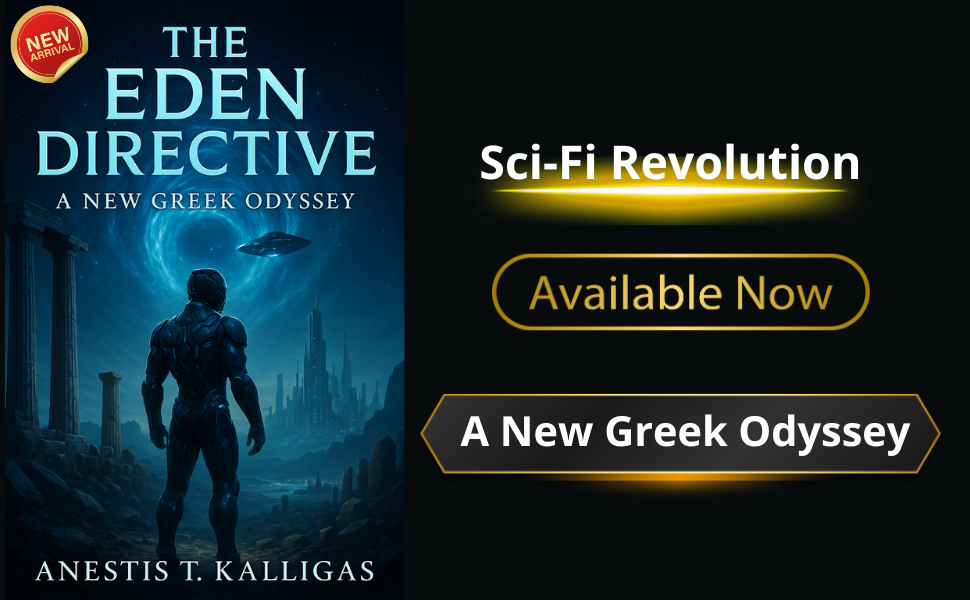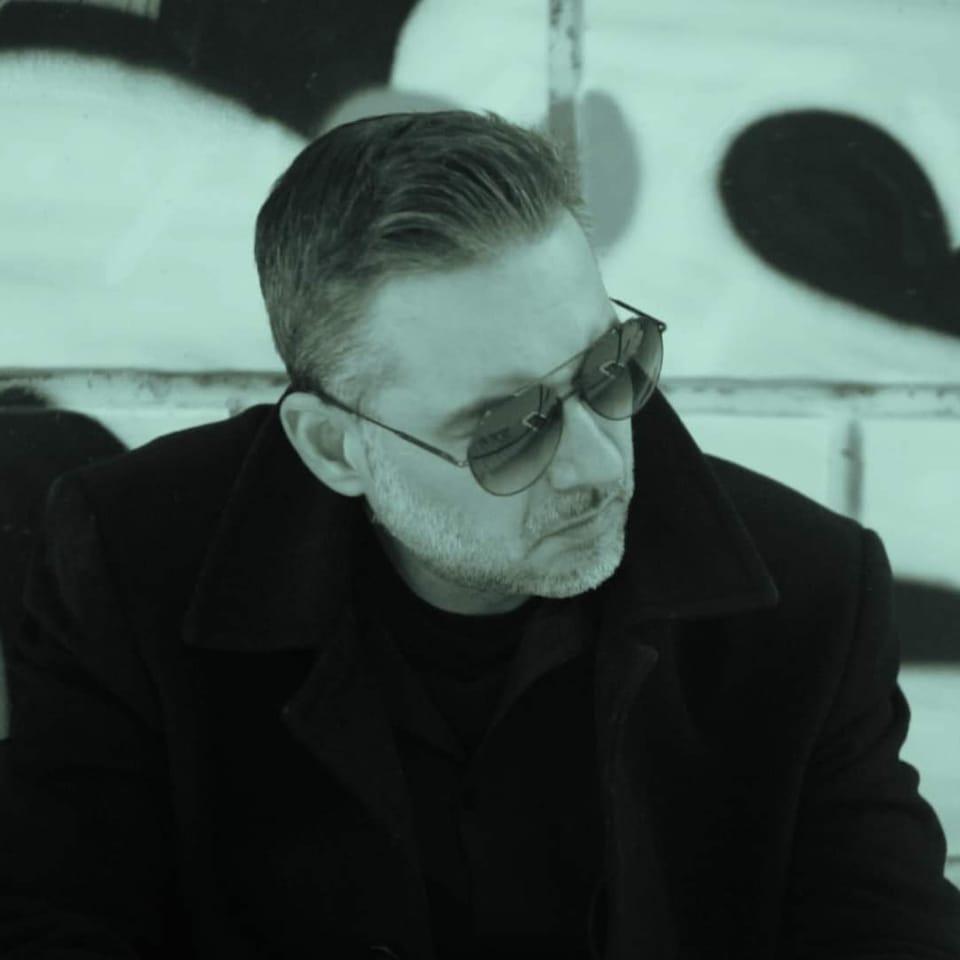Greece’s Most Mysterious New Sci-FI Novelist—And His World Beyond Money

The New Name in Sci-Fi You’ll Hear About Next. Although there isn’t much buzz yet, we’re confident having read the work of this enigmatic author that in the years ahead it will lay the foundations for a brilliant career , leaving a clear mark that may become his legacy to future generations, and we too await the moment when the book is finally recognized.
In a year full of safe, familiar books, Anestis (Tasos) Kalligas takes a big risk. His debut novel, The Eden Directive: A New Greek Odyssey
, is bold, fast, and very different. It mixes near-future action with big ideas about how we live together. It is the kind of book people argue about—and remember.
https://www.amazon.com/author/anestiskalligas
A simple, radical question
The story is set in 2090. The world is broken. Three percent of people live in comfort. The other ninety-seven percent face hunger, cold, and long lines for food. There is still enough food for everyone, but it is locked away by the rich. Governments talk. Nothing changes.
From this harsh picture, the book asks one clear question: Can we build a society without money? Not chaos. Not anarchy. A planned, fair system where people take part, share, and make decisions together.
Kalligas gives this system a name: Synthiocracy. The word blends “synthesis,” “divinity,” and “democracy.” In simple terms, it is a public life guided by ethics first, with technology used carefully and transparency built in. It borrows from classical Greek ideas—aretē (virtue), politeia (civic order), and metochē (participation)—and projects them into a high-tech future.
If Foundation by Isaac Asimov showed us how empires fall,And Do Androids Dream of Electric Sheep? made us question what it means to be human…
If 1984 by Orwell warned us about total control,And Childhood’s End by Clarke imagined humanity’s transformation…
If Brave New World by Huxley explored artificial peace,And Sapiens by Harari exposed the myths behind our society…
Then The Eden Directive is your next odyssey.
From the very land where democracy was born — ancient Greece —everything begins again in the year 2090.
A page-turner with a brain
This is not a dry essay. The novel moves quickly. There is war, action, espionage, romance, secret labs, alien tech, and strong visual scenes. You can easily imagine it as a streaming series. Think of crowded city streets, clean high-tech rooms, open public halls where decisions are made in the open—and no money changes hands.
At the center of the plot is a single, powerful idea: a “food printer” that could end hunger for good. But Kalligas keeps the focus on people, not gadgets. He reminds us that tools reflect values. If our values don’t change—how we share, how we cooperate, how we decide—then even a miracle machine will serve only a few.
This is why the book speaks to our moment. Many readers worry about artificial intelligence and automation. Jobs are changing or disappearing. The novel asks: What comes after work? How do we protect dignity, purpose, and belonging when paychecks are no longer the core of life?
Greek roots, modern lens
Many future stories lean on cold technocracy or dark dystopia. The Eden Directive chooses another route. It draws on Greek tradition—not as decoration, but as a moral spine. It argues for accountability before speed, shared good before private gain. The result is a future that feels designed, not random; hopeful, but not naive.
Not a religious book—but a clear critique
Readers often ask where this vision came from. Kalligas gives a short answer: “A week on Mount Athos was enough.” He describes it not as a religious awakening, but as a week of silence and clarity that unlocked ideas.
Important note: this is not a religious novel. In fact, it criticizes religion as a money-making industry when it becomes that. It also takes aim at corporations and political theater. Still, the tone is not angry or anarchic. The book deconstructs today’s systems in a calm, democratic way and invites readers to think, not shout.
Big questions, human stakes
Beyond the politics, the book plays with deep questions:
- What if death was a design flaw?
- What if forgetting keeps the system in place?
- What does wisdom mean in a diverse society?
- Where should AI guidance stop and human choice begin?
We meet genetically designed citizens, AIs that refuse to rule or obey, and forbidden texts that change how people see the past. The revolution here does not come from violence. It comes from awakening—from asking better questions and acting together.
If it streams, it’ll sing
You can imagine eight tight episodes: Athens and orbit, quiet monasteries and loud streets, citizens in open councils, engineers in clean rooms. The world-building is vivid but efficient, built for the screen without losing the book’s heart.
About the author

Anestis (Tasos) Kalligas has an unusual background that serves this story well. He is the son of an Air Marshal and grew up in different countries. He worked for over a decade as a national TV journalist in Greece, trained to notice social change and human detail. Today, he blends 11 years in advanced digital marketing and AI with a love for philosophy and storytelling. He founded a Greek web radio station and practices Aikido, a martial art focused on redirecting force rather than clashing head-on. That idea—redirection over collision—runs through his political vision.
Although there isn’t much buzz in Greece yet, we’re confident—having read the work of this enigmatic author—that in the years ahead it will lay the foundations for a brilliant career (we hope not posthumously), leaving a clear mark that may become his legacy to future generations, and we too await the moment when the book is finally recognized.
Early response
Early readers are enthusiastic. Some give it five stars. More important, they debate it. Can a post-money system scale? How do we define wisdom in a plural world? Where is the line between useful AI and human sovereignty? The book does not claim to have all the answers. It presents a workable provocation—a model to test, not worship.
Why it matters now
Two things can happen to a book like this. It can be ignored now and praised later, as has happened to many bold writers. Or it can catch fire in its own time, because people are too tired of the old answers and ready to try new ones. Either way, The Eden Directive expands the conversation.
If you believe AI will disrupt millions of jobs, and that the answer must be more than subsidies and slogans, you will find plenty here to underline, share, and argue with. If you read science fiction only to escape, you may still be surprised: this book offers a forward escape—a way to move toward a more intentional future.
“They told us we were free,” one line reflects, “but our choices were written before we were born.” Kalligas’s aim is to rewrite those choices—not with a lecture, but with a story that makes a different future feel possible.
A new Greek odyssey begins here. And it does not look like anything else on the shelf.



